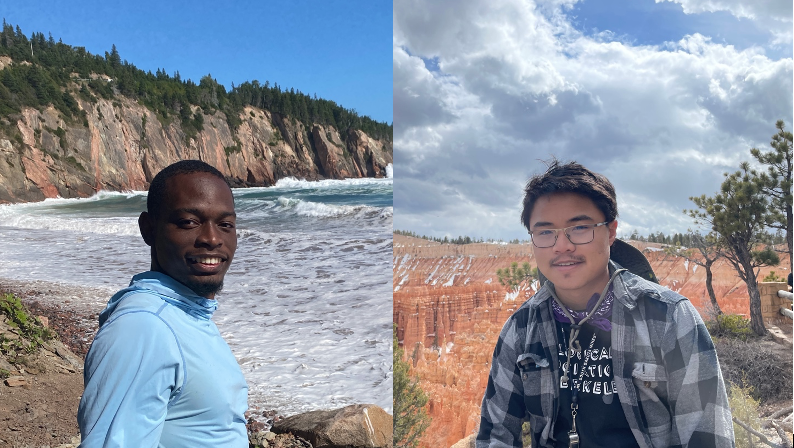Graduate Fellowships
Pushing for Progress at the Division Level

Faculty support for diversity, equity, and inclusion in Caltech’s Division of Geological and Planetary Sciences has inspired alumni, friends, and outside organizations to join in.
As the Caltech community focuses more attention on issues related to diversity, equity, and inclusion (DEI), the Division of Geological and Planetary Sciences (GPS) has set an example for division-level efforts to cultivate an environment that enables all scholars to thrive and realize their full potential. With generous support from faculty, alumni, and other friends, the goal is to attract the brightest and most creative scholars to fulfill the Institute’s core mission of expanding human knowledge and benefiting society.
Recruiting New Support for the Very Best Students, Postdocs, and Faculty
“GPS is committed to DEI because we want to continue to attract and support the very best students, postdocs, and faculty,” says John Grotzinger, the Harold Brown Professor of Geology and holder of the Ted and Ginger Jenkins Leadership Chair. “Diversity promotes creativity, equity allows all voices to be heard, and inclusion creates a team. Research success depends on creativity, and creativity has many sources.”
In 2020, to help build a strong foundation for DEI within the division, each GPS faculty member committed $10,000 from laboratory discretionary funds to create an initial endowment of $400,000.
“Discretionary money is a precious resource for every faculty member—we all treasure it,” says Paul Asimow, the Eleanor and John R. McMillan Professor of Geology and Geochemistry and chair of GPS’s DEI committee. “But as a group and as individuals, it was clearly the right thing to do, to say: ‘We’re not going to just keep doing what we’ve been doing and spending money the way we’ve been spending money. Let’s make a change and put our funds behind it.’”
Following the faculty’s lead, the division and all its major centers contributed another $300,000. Then, members of the GPS Chair’s Council, alumni, and trustees provided an additional $300,000 to the endowment. This, in turn, inspired others to give.
A recent gift from the Rose Hills Foundation, for example, supports up to four graduate fellowships each year and enhances recruitment of postdoctoral scholars and faculty from historically underrepresented backgrounds.
“The Rose Hills Foundation saw our commitment to DEI and surprised us with a generous gift,” Grotzinger says. “Supporting underrepresented groups brings a diversity of ideas that enrich the Institute and help fulfill our core mission of expanding human knowledge.”
Putting Funds to Work
To support division members, bolster recruitment and outreach, and strategize how best to allocate funds, GPS created a DEI committee composed of faculty, students, and postdoctoral scholars. Committee members used a roadmap created by the Black Scientists and Engineers of Caltech to help shape their initial efforts.
Since its inception in 2020, the committee has initiated a number of DEI-focused projects, including the development of a DEI web space to promote division-wide communication. It has created GPS Faculty Fellowships to support first-year graduate students who have special financial needs or show a strong potential to contribute to the division’s DEI efforts. It has sponsored two workshops to help faculty sharpen their mentoring skills. It helped convene a geo-ethics reading group. And it cosponsored the Institute’s FUTURE Ignited program, a virtual conference with the goal of recruiting underserved graduate students and summer undergraduate researchers, among other accomplishments.
“We’ve seen a lot of people putting their time and their energy into thinking about how they’ve been working and whether they can do better,” Asimow says, noting that increased funding could do even more by encouraging students and faculty to attend meetings aimed at promoting networking among scientists from underrepresented groups and by supporting additional summer undergraduate research fellowships, for example.
Josh Anadu, who is pursuing a doctorate in geobiology, is one of several graduate students who have benefited from GPS fellowship support. He says the funding he received helps alleviate the fear of putting financial burdens on his family.
“As a Nigerian, my ability to provide financial support for my close family, extended family, and broader community deeply matters to me,” explains Anadu, who is working with Grotzinger and geobiology professor Woodward Fischer to study the coevolution of the biosphere and geosphere through the lenses of sedimentology and isotope geochemistry. “There were points in the graduate school process where I struggled to justify my desire to pursue science because other commitments made the decision feel extremely selfish and myopic. The fellowship support is thoughtful and helped encourage a student from a non-academic background like me to pursue my interests."
Paolo Sanchez, a first-year graduate student in geochemistry with specific interests in mineralogy, petrology, and field geology, also recently received a financial boost from the division.
“The GPS DEI fellowship has not only provided outlets for expanding my research in the field and lab, but also given me opportunities to connect with the greater scientific community at international conferences,” says Sanchez, who hopes to become a professor or professional researcher.
Leigh Engen (BS ’99), a member of the GPS Chair’s Council who has supported DEI initiatives across campus, says she is inspired by Caltech’s spirit of collaboration, particularly in GPS.
“It’s my hope that these initiatives will increase the sense of belonging for all students,” Engen says, “and that we will make sure collaborative experiences are available to everyone—as they should be—so everyone will have equal opportunity to be a part of the exciting stories coming out of Caltech.”
This archived content may contain outdated information or references that may not reflect current practices or programs.